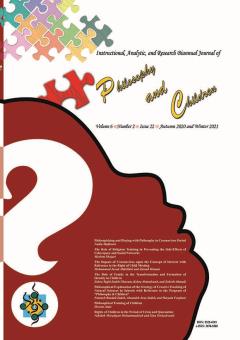Philosophizing and playing with Philosophy in Coronavirus Period
Subject Areas : “Philosophy and children” and education
1 - Associate Professor, Islamic Philosophy and Wisdom Department, University of Tehran, Tehran, Iran
Keywords: Game, amusement, teaching philosophy, coronavirus period, Fārābī,
Abstract :
Game, amusement, and pleasure are the issues that always reflected on Fārābī’s works to the extent that he considered them as necessary and useful artworks within the framework of moral, moderate and happy considerations. For him, those who work hard and are serious for attaining their rational happiness should enjoy a kind of tranquility and rest in order to feel refreshed in following up their objectives. Game and amusement are often accompanied with imitative images. The word imitation or mimesis is used by Abū Bashār Mattā in the translation of Aristotle’s Art of Poetics. Aristotle’s mimesis is the same imitation as monkey or parrot also does it. Ibn Sīnā, Khwajah Naṣīr al-Dīn Ṭūsī, and ‘Allāmah Ḥillī also used this term in their works. For Fārābī the meaning of mimesis is more than imitation and is associated with creation. In his view the faculty of imagination contains three potencies of preserving the sensory forms, and then possessing and imitating them. Man in the third one juxtaposes a sensory form with another sensory form which is usually coupled with a meaning. Moreover, imagination imitates universal and philosophical concepts and the intellectuals. Mimesis may take place with the aim of carrying out an amusement and game. Since in Fārābī’s view game and amusement are used in moral sense and he referred to them openly so they are not indecent and disapproved. Teachers can use from games in their teaching. In teaching Islamic philosophy, gnosis, and logic in coronavirus period, the author used from various games and utilized the facilities of Tehran University. Usually, cyberspace classroom is prosy as compare to the real classrooms but there are certain merits in cyberspace classroom that real classrooms lack them. Of course, Tehran University uses the same international model system for teaching students.
ابنسينا (1315) رساله در روانشناسی، مقدمه و حواشی و تصحیح محمود شهابی، تهران: کتابخانه خیام.
ابنسينا (1331) رسالۀ نفس، تصحيح موسي عميد، تهران: انجمن آثار ملي.
ابنسينا (1331) طبیعیات دانشنامه علایی، مقدمه و حواشی و تصحیح محمد مشکوة، تهران: انجمن آثار ملی.
ابنسينا (1359) عیون الحکمة، تحقیق عبدالرحمن بدوی، بیروت: دارالقلم.
ابنسينا (1363) المبدأ و المعاد، به اهتمام عبدالله نوراني، تهران: مؤسسة مطالعات اسلامي دانشگاه مكگيل.
ابنسينا (1364) النجاة، تحقيق محمدتقي دانشپژوه، تهران: دانشگاه تهران.
ابنسينا (1375) الاشارات و التنبیهات، بهمراه شرح خواجه نصیرالدین طوسی، قم: نشر البلاغه.
ابنسينا (1396) المختصر الاوسط فی المنطق، مقدمه و تصحیح سیدمحمود یوسف ثانی، تهران: مؤسسة پژوهشی حکمت و فلسفه.
ابنسينا (1400) رسائل، تحقيق محسن بيدارفر، قم: بیدار.
ابنسينا (1404ق/ الف) التعليقات، تحقيق عبدالرحمن بدوي، قم: مكتبه الاعلام الاسلامي.
ابنسينا (1404ق/ ب) الشفاء، الطبيعيات، مقدمه ابراهيم مدكور، قم: كتابخانه آيتالله العظمي مرعشي.
ابنسينا (1405ق) جوامع علم الموسيقی، تحقيق زكريا يوسف، قم: كتابخانه آيتالله العظمي مرعشي.
ابنسينا (1428ق) الشفاء، ج4، مقدمه و تحقیق ابراهیم مدکور، قم: ذوی القربی.
سهروردی، شهابالدین (1380) مجموعه مصنفات شیخ اشراق، ج2، تصحیح و مقدمه هانری کربن، تهران: پژوهشگاه علوم انسانی و مطالعات فرهنگی.
طوسی، خواجه نصیرالدین (1376) اساس الاقتباس، تصحیح مدرس رضوی، تهران: دانشگاه تهران.
طوسی، خواجه نصیرالدین (1388) منطق التجرید، در الجوهر النضید، تصحيح محسن بيدارفر، قم: بيدار.
فارابی، ابونصر محمدبن محمد (2003م) آراء اهل المدینة الفاضلة و مضاداتها، مقدمه و تعلیقات علی بوملحم، بیروت: دار و مکتبة الهلال.
فارابی، ابونصر محمدبن محمد (بیتا/ الف) المنطقیات، ج1، تحقیق و مقدمه محمدتقی دانشپژوه، قم: کتابخانة آیتالله مرعشی.
فارابی، ابونصر محمدبن محمد (بیتا/ ب) موسیقی کبیر، تحقیق و شرح غطاس عبدالملک خشبه، قاهره: دارالکاتب العربی للطباعة و النشر.
متی بن یونس، ابوبشر (1967م) کتاب ارسطوطالیس فی فن الشعر، مقدمه زکی نجیب محمود، ترجمه و تحقیق شکری محمد عیاد، قاهره: دارالکاتب العربی للطباعة و النشر.
مفتونی، نادیا (1393الف) پژوهشی در فلسفه علم دانشمندان مسلمان، تهران: سروش.
مفتونی، نادیا (۱۳۹۳ب) فارابی و فلسفه هنر دینی، تهران: سروش.

